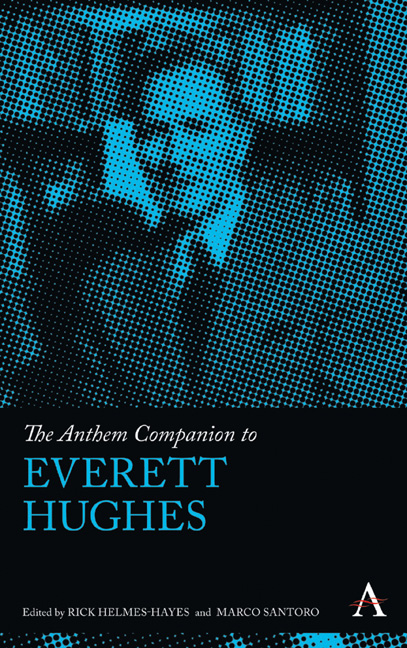Book contents
- Frontmatter
- CONTENTS
- List of Illustrations
- Foreword Everett C. Hughes, Great Teacher
- Insight through Craftsmanship: The Sociological Legacy of Everett Hughes
- Chapter One Everett Hughes and the Chicago Tradition
- Chapter Two Studying “Going Concerns”: Everett C. Hughes on Method
- Chapter Three The Natural History of Everett Cherrington Hughes: A Master of Fieldwork
- Chapter Four Everett C. Hughes: A Key Figure of the Canadian Chicago School Diaspora
- Chapter Five Everett Hughes: Notes from an Apprentice
- Chapter Six An American in Frankfurt: Everett C. Hughes's Unpublished Book on Germans after the End of the Nazi Regime
- Chapter Seven The Origins and Evolution of Everett Hughes's Concept: ‘Master Status’
- Chapter Eight Discovering the Secret of Excellence: Everett Hughes as a Source of Inspiration in Researching Creative Careers
- Chapter Nine Everett Hughes on Race: Wedded to an Antiquated Paradigm
- Notes on Contributors
- Index of Names
- Index of Subjects
Chapter One - Everett Hughes and the Chicago Tradition
Published online by Cambridge University Press: 17 June 2017
- Frontmatter
- CONTENTS
- List of Illustrations
- Foreword Everett C. Hughes, Great Teacher
- Insight through Craftsmanship: The Sociological Legacy of Everett Hughes
- Chapter One Everett Hughes and the Chicago Tradition
- Chapter Two Studying “Going Concerns”: Everett C. Hughes on Method
- Chapter Three The Natural History of Everett Cherrington Hughes: A Master of Fieldwork
- Chapter Four Everett C. Hughes: A Key Figure of the Canadian Chicago School Diaspora
- Chapter Five Everett Hughes: Notes from an Apprentice
- Chapter Six An American in Frankfurt: Everett C. Hughes's Unpublished Book on Germans after the End of the Nazi Regime
- Chapter Seven The Origins and Evolution of Everett Hughes's Concept: ‘Master Status’
- Chapter Eight Discovering the Secret of Excellence: Everett Hughes as a Source of Inspiration in Researching Creative Careers
- Chapter Nine Everett Hughes on Race: Wedded to an Antiquated Paradigm
- Notes on Contributors
- Index of Names
- Index of Subjects
Summary
One picture always comes to mind when thinking of Everett Hughes as a teacher. He is standing at the lectern, his glasses, which he had just removed, in his hand, and, with unconcealed relish, he is putting the finishing touches on some illustration. To his students those finishing touches were the mark of a singular craftsman. The craftsmanship lay in the precision and seeming effortlessness with which he would dissect the most commonplace situation and, with a deft and unexpected comparison, lay bare its core.
(Zakuta 1968, 69)Marginality, accepted in the spirit of adventure, makes the sociologist. The best way of acquiring and keeping it is to keep changing, not necessarily from one employer to another, but from one object of study to another.
(Hughes 1984, 529)More than a dozen years after his death in 1983, Everett C. Hughes is generally recognized as one of the links between the founders of “The Chicago School” – W. I. Thomas and Robert E. Park (to whom we might add Ernest W. Burgess and the philosopher George Herbert Mead) – and the group of sociologists trained at the University of Chicago in the 1940s and ‘50s, who are often labeled collectively as symbolic interactionists. 1 This group, notable for its studies of institutions, work and the professions, art, deviance, and medicine, includes such researchers as Erving Goffman (1961, 1963), Howard S. Becker (1963, 1982), Anselm Strauss (1978), and Eliot Freidson (1970), who have also contributed to making fieldwork – the ethnographic method – one of the most fruitful research approaches in the social sciences. As some of them have emphasized, their sociology, as well as their use of fieldwork, had its origin partly in the teaching and research of Everett C. Hughes at the University of Chicago.
Hughes’ position as a link between these two groups would be enough to arouse interest in his work. But that work also offers the elements of a fruitful approach to the study of such central sociological themes as work, institutions, the relations between ethnic groups, and, beyond that, a lively and reflexive conception of research on society as a collective enterprise.
Among the obstacles to understanding this current of research, one is easy to identify.
- Type
- Chapter
- Information
- The Anthem Companion to Everett Hughes , pp. 39 - 70Publisher: Anthem PressPrint publication year: 2016

